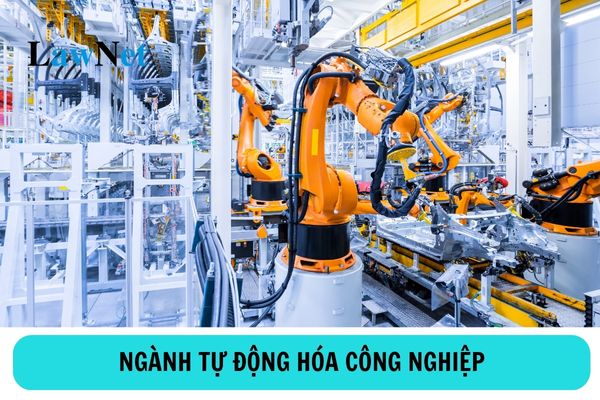What can graduates of the intermediate level in the field of industrial automation do after graduation in Vietnam?
What can graduates of the intermediate level in the field of industrial automation do after graduation in Vietnam?
Based on Subsection 5, Section B, Part 7 of the Regulations on the Minimum Volume of Knowledge and Competency Requirements for Graduates at Intermediate and Collegiate Levels in the Fields of Electrical, Electronics, and Telecommunications (hereinafter referred to as the Regulations) issued with Circular 48/2018/TT-BLDTBXH, graduates of the industrial automation intermediate level can undertake the following tasks:
- Installing automated equipment and systems;
- Operating and supervising automated systems;
- Maintaining and repairing automated equipment and systems;
- Providing technical consulting and business services for automated equipment;
- Installing and operating industrial robots.

What can graduates of the intermediate level in the field of industrial automation do after graduation in Vietnam? (Image from the Internet)
What are regulations on the Nature of the Industrial Automation Intermediate Level in Vietnam?
Based on Subsection 1, Section B, Part 7 of the Regulations issued with Circular 48/2018/TT-BLDTBXH, the industrial automation intermediate level field is defined as follows:
The industrial automation intermediate level is a field where practitioners design, manufacture, and install automated production lines; apply specialized software for programming control, monitoring, and managing production systems. The goal is to increase labor productivity, improve product quality, and remove humans from hazardous environments, meeting level 4 requirements in the Vietnamese National Qualifications Framework.
Industrial automation practitioners will engage in research and design tasks at companies providing technological solutions, consulting and design, or work at companies implementing and installing production lines; or directly operate and maintain automated production lines in factories.
Additionally, practitioners can be sales and customer support staff for companies specializing in providing automated equipment.
To practice this profession, workers must be in good health, have strong professional ethics, and possess adequate expertise and technical skills for their job positions. They should be able to handle and resolve tasks proactively, communicate, and collaborate in teams, organize and manage the production process, and mentor lower-level workers.
Minimum knowledge volume: 1,580 hours (equivalent to 56 credits).
What are the knowledge requirements for industrial automation intermediate level students in Vietnam?
Based on Subsection 2, Section B, Part 7 of the Regulations issued with Circular 48/2018/TT-BLDTBXH, industrial automation intermediate level students must meet the following knowledge requirements:
- Explain the principles and standards to ensure electrical safety for people and equipment;
- Explain the functions, operating principles, and applications of different types of motors, sensors, basic electronic circuits, measuring instruments, specialized controllers, and protective devices such as relays, contactors, sensors, etc.;
- Explain methods for measuring electrical and non-electrical equipment;
- Explain methods for installing industrial automation equipment;
- Explain the operating principles and functions of industrial robots;
- Explain the significance of setting parameters in common industrial controllers;
- Explain the symbols and conventions of technical drawings, electrical schematic diagrams according to IEC standards;
- Explain the process of inspecting, maintaining, and calibrating automatic control systems;
- Describe the safety and industrial hygiene rules and fire prevention guidelines;
- Explain the procedures and content of technical consulting and business services for automated equipment;
- Explain basic knowledge of politics, culture, society, law, national defense and security, and physical education as regulated.
What are the skill requirements for industrial automation intermediate level students in Vietnam?
Based on Subsection 3, Section B, Part 7 of the Regulations issued with Circular 48/2018/TT-BLDTBXH, industrial automation intermediate level students must meet the following skill requirements:
- Interpret symbols and conventions of technical drawings, electrical schematic diagrams according to IEC standards;
- Identify, classify, select, check the operating conditions, and use types of motors, sensors, basic electronic circuits, measuring and control instruments, specialized controllers, protective devices such as relays, contactors, sensors, etc.;
- Use specialized software to draw wiring diagrams for controllers and peripheral devices;
- Install, set parameters, and operate electrical-automated equipment;- Proficiently use common specialized tools;
- Program PLC applications for simple systems using basic programming commands;
- Maintain and repair some equipment and parts of automated systems;
- Apply labor safety and environmental hygiene measures according to the law in installing, repairing, maintaining, and calibrating equipment in automated control systems;
- Provide technical consulting to customers about automated equipment business;
- Use basic information technology as regulated; exploit, process, and apply information technology in specialized professional tasks;
- Use basic foreign languages, achieving level 1/6 of the Vietnamese Foreign Language Proficiency Framework; apply foreign languages in specialized professional tasks.

